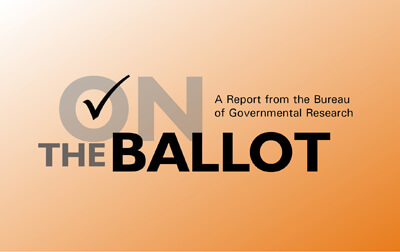
Tax for New Orleans elderly services should be rejected, BGR says
By Kevin Litten
Source: NOLA.com | The Times-Picayune
March 12, 2019
New Orleans voters should reject a new tax later this month dedicated to senior services because it gives city officials spending authority that is too broad and poorly planned, according to a Bureau of Governmental Research report.
The report, released Tuesday (March 11), does not object to providing more city money for senior services, calling that goal “important and laudable.” But BGR argues that the city hasn’t done enough to identify spending priorities or create revenue strategies to support priorities.
The tax, if passed, is expected to generate about $6.6 million and would cost the average homeowner $56.80 more each year on a house that sells for $359,000, according to BGR. It would add about $20 to a tax bill for every $100,000 of value above the $75,000 homestead exemption, the report said.
City Council members voted in October to put the tax before voters, over objections from Mayor LaToya Cantrell. Her primary concern is a lack of accountability because the money raised would go to the Council on Aging, which City Hall doesn’t control. While the Council on Aging helped develop the proposal, the ballot measure does not name the organization as a direct recipient of tax revenue.
Council members have said they believe a tax for elderly services has been needed for years, and they want expand programs such as Meals on Wheels. The Council on Aging currently receives about $1.5 million annually from the city’s general fund.
BGR does not question that senior services need more money: There are about 74,000 residents over age 60 in New Orleans, many of whom live alone. The city does not put as much money toward elderly services as other parishes, BGR wrote. Orleans Parish would the 30th in Louisiana to have a dedicated source of revenue for elderly services if voters approve the tax March 30.
If approved, New Orleans would increase its spending from $108 per senior citizen living in poverty to $592, well ahead of Jefferson ($279) and St. Tammany Parish ($361).
How that money would be spent isn’t clear to voters, BGR said. The Council on Aging has said the tax revenue it would allow it to expand Meals on Wheels to seven days a week and eliminate its waiting list. Other programs that have been cut or curtailed over the years could be revived or expanded.
Without a specific dedication, the City Council would have broad discretion over how to spend the tax money. Council members told BGR they will develop a companion ordinance saying how funding would be allocated.
It is also not clear whether the city would reduce its general fund allocation for the Council on Aging if the tax passes, BGR wrote. Also unclear is why the tax would be collected for five years instead of the usual 10-year term, although council members told BGR they wanted evaluate the tax sooner.
Even if the council revisits the tax, BGR wrote, they haven’t give voters any benchmarks they would use to evaluate it.
“If the city wants to impose a dedicated tax for elderly services, it must develop and provide the public with a prioritized assessment of the needs of the elderly population,” BGR wrote. “It must also commit to use the tax for serving the highest priority needs. In addition, the city administration and City Council should assess and prioritize future municipal revenue needs, including those of the elderly, and it should develop a funding strategy to address them.”
Correction: The date of the election in this story has been corrected to March 30.
Fair Use Notice
This site occasionally reprints copyrighted material, the use of which has not always been specifically authorized by the copyright owner. We make such material available in our efforts to advance understanding of issues and to highlight the accomplishments of our affiliates. We believe this constitutes a “fair use” of any such copyrighted material as provided for in section 107 of the US Copyright Law. In accordance with Title 17 U.S.C. Section 107, the material on this site is available without profit. For more information go to: US CODE: Title 17,107. Limitations on exclusive rights: Fair use. If you wish to use copyrighted material from this site for purposes of your own that go beyond “fair use,” you must obtain permission from the copyright owner.
